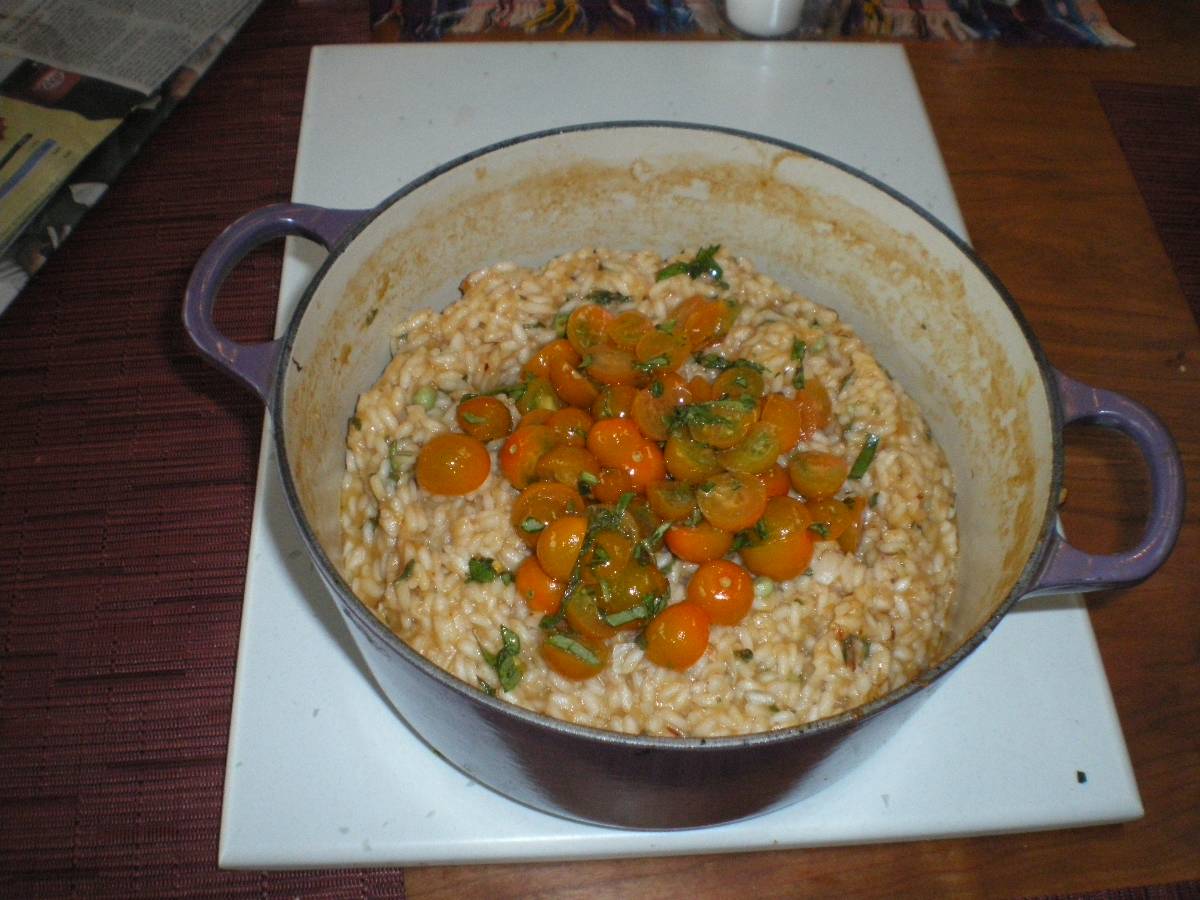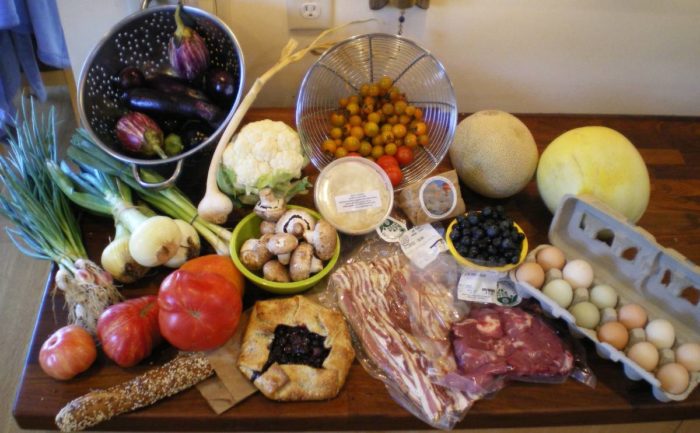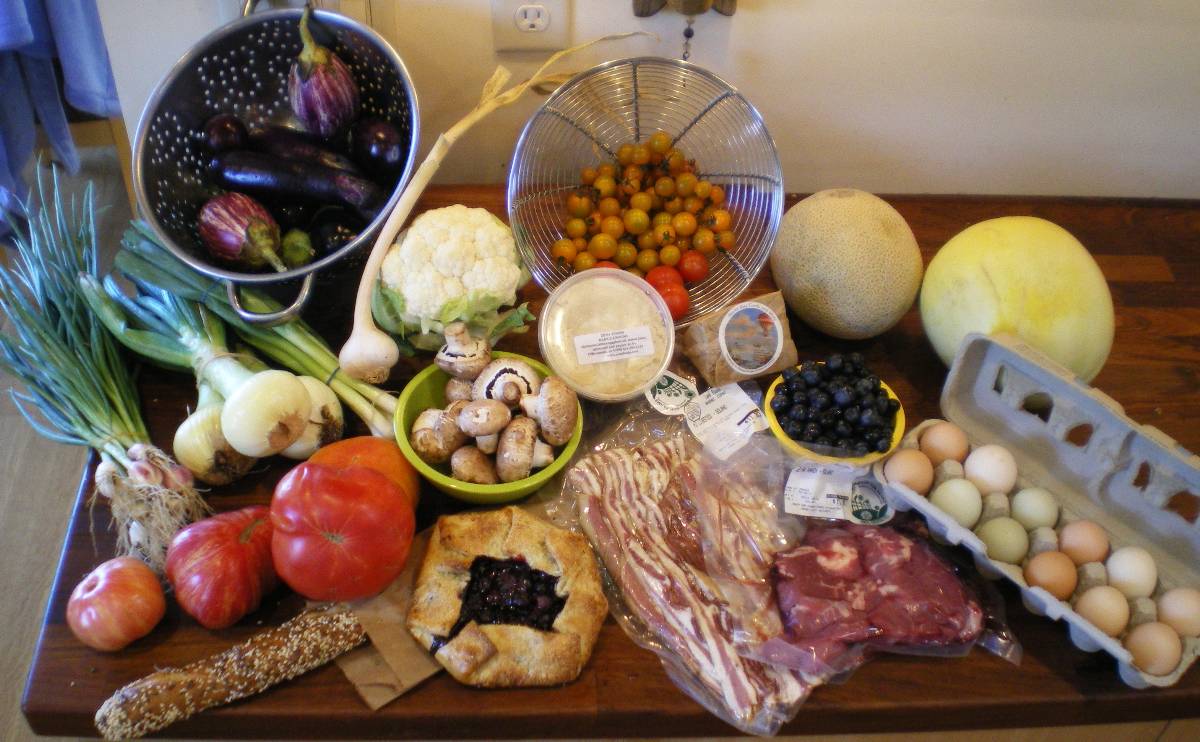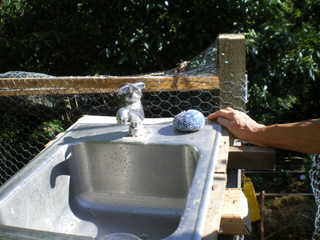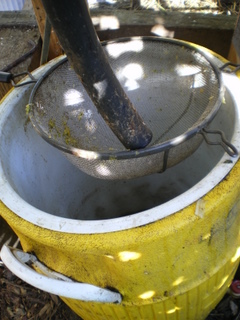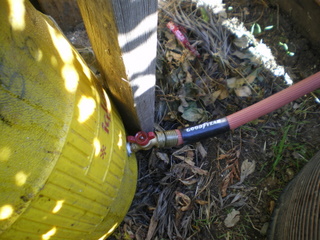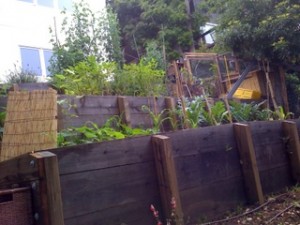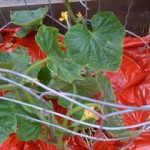William Burroughs, a guy with a weird imagination if there ever was one (Dr. Benway, I presume?), wore plain gray suits to preserve a certain public anonymity. I feel the same way about bumper stickers. I want my gray car to blend into the flow of traffic, unnoticed by all. Not to mention that if you have a bumper sticker on your car and then drive badly, you’re undermining whatever cause your sticker promotes. Yesterday I was cut off by Veterans for Peace, and aced out of my parking space by Keep Tahoe Blue. Not that it makes me want to turn the lake orange or declare war, but it doesn’t help. And just when I had decided never, a friend brought me this. But I think I’ll post it here and on my fridge, not on my car.
Month: June 2011
Mackinnon-Patterson risotto
Last night I made a spring tomato risotto recipe from the “Fast Slow Food” series in the Wall Street Journal. I had a lot of spring tomatoes from the farmers’ market, and the recipe called for Carnaroli rice. I had a few pounds of this I brought back from Italy. It’s bigger and toothier than Arborio rice and perfect for risotto. The recipe was easy enough (as described), even counting straining the tomato and celery blend. I don’t usually strain things–too finicky for me–but decided to follow the recipe exactly as I’d never made anything by Mackinnon-Patterson before (well almost exactly–had to add some minced garlic to the onions, a few chopped snow peas for a little of the celery and a handful of English peas at the end as we have so many). While I liked the idea of olive oil instead of butter, the result was a little bland. Can’t say I was completely surprised–the recipe calls for water, not stock. I can’t think of any risotto that wouldn’t be improved by using stock, even a little light vegetable stock instead of water. I threw in a pinch of pepper flakes and some Italian dried peppers and garlic at the end for a little pep. Maybe I would call this, “so-so risotto.” To be fair, the risotto might be a little livelier later in the summer when the tomatoes are at their best, but then it wouldn’t be spring tomato risotto. Also, I would substitute some white wine along with stock for the water.
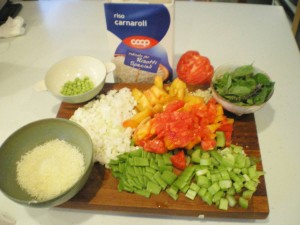 I’ve become a cook who assembles her ingredients before she starts to cook. This is rewarding! Here is the recipe as printed in the WSJ. If you try it, let me know how it works for you.
I’ve become a cook who assembles her ingredients before she starts to cook. This is rewarding! Here is the recipe as printed in the WSJ. If you try it, let me know how it works for you.
TOMATO RISOTTO
TOTAL TIME: 30 MINUTES; SERVES: 6
½ cup extra-virgin olive oil
½ cup yellow onion, diced small
1 tablespoon salt, plus extra for seasoning
4-6 cups water
1 pound juicy, ripe tomatoes
2 stalks celery
2 cups Carnaroli or arborio rice
4 tablespoons basil, chopped medium-fine
1 cup grated parmesan cheese
2 tablespoons lemon juice
1 cup cherry tomatoes, halved
WHAT TO DO:
1. Set a medium heavy-bottomed pot over medium-low heat. Swirl in 2 tablespoons olive oil. Add onions and 1 teaspoon salt. Sweat onions until translucent, about 5 minutes.
2. In another pot, bring water to a simmer.
3. While water heats up and onions cook, juice tomatoes and celery. If you don’t have a juicer, pulse tomatoes and celery in a food processor or blender until liquefied. Push through fine mesh strainer, reserving juice and discarding solids.
4. Turn onion pot’s heat up to medium-high and stir rice into the sautéed onions. Toast 2 minutes, or until grains are hot and opaque.
5. Deglaze pot with 2 cups simmering water. Stir until liquid is absorbed and season with 2 teaspoons salt. Adjust heat to keep risotto at a steady simmer. Add another 1-2 cups water and continue to stir often.
6. Once liquid is absorbed, add another 1-2 cups water and continue to stir regularly.
7. When rice has cooked for about 15 minutes, or once it is five minutes shy of al dente, stir in tomato juice. Cook, while stirring, 4 additional minutes, or until risotto is creamy and rice is al dente.
8. Quickly stir in 4 tablespoons olive oil, basil and parmesan. Remove from heat and add lemon juice. Taste and season with salt, if needed.
9. In a small bowl, mix cherry tomatoes with 2 tablespoons olive oil and pinch of salt.
10. Garnish risotto with tomato-oil mixture. Serve immediately.
Monday, Monday
A friend spent the night last night, and added to our breakfast conversation by reading aloud from the Monday Metropolitan Diary section of the New York Times:
“Practice, practice, practice may be the way to Carnegie Hall, but is it worth it if no one remembers your name, much less the hall itself?
Recently overheard from a couple settling into their seats behind me before a concert: “This is where we heard that guy play the piano, isn’t it?”
That’s the problem with fame in a nutshell!
Then Larry said that there was a place called The Royal Roost in New York where Charlie Parker, Dizzy, Miles, Kenny Durham and other jazz greats used to play that was nicknamed The Metropolitan Bopera House.
Then I got to the work of the morning. Every Monday I send a poem to a little group of poets who trade poems each week. We’ve been doing this almost 10 years now! We each have a day. Sometimes we send our poems, but most often a poem we’ve encountered that we like a lot. Today I sent out a poem by Tony Hoagland, one of my favorite poets.
 I love the way he mixes humor and the overpowering emotions we each feel, how he takes a situation everyone can recognize—the desire to seduce someone—and elevates it. Then he brings us back to earth, reminding us that we live here, amid the base, confusing and overpowering passions, no matter how much we love literature.
I love the way he mixes humor and the overpowering emotions we each feel, how he takes a situation everyone can recognize—the desire to seduce someone—and elevates it. Then he brings us back to earth, reminding us that we live here, amid the base, confusing and overpowering passions, no matter how much we love literature.
The Collaboration
That was the summer I used The Duino Elegies
in all of my seductions,
taking Rilke from my briefcase
the way another man might break out
candlelight and wine.
I think Rilke would have understood,
would have thought the means
justified the end, as I began to read
in a voice so low it forced my audience
to lean a little closer,
as if Rilke were a limestone bench
stationed on a hillside
where lovers gathered to enjoy the vista
of each other listening.
What a chaperone,
and what a view—is it Susan
I am thinking of?—
how, in the middle of the great Ninth Elegy,
in the passage where the poet
promises to memorize the earth,
her tanned and naked knee
seemed the perfect landing platform
for any angels in the vicinity.
I think Rilke would have seen
the outline of an angel
in the space between our bodies
just before we kissed,
then seen it vanish
as we clashed together
and commenced our collaboration
on another chapter
of the famous, familiar and amusing
saga of human relations—choosing
heat instead of grace,
possession over possibility—trading
the kingdom of heaven
one more time
for two arms full
of beautiful, confusing earth.
This poem is from Sweet Ruin, like all of Tony’s books, worth owning! For those interested in poetics, his book of essays, Real Sofistikashun, is a treat.
From the Farmers’ Market
This is what I bought at the Kensington Farmers’ Market today. The meat packages are lamb bacon and goat stew. The little plastic container is baba ghanoush, with a piece of local parmesan wrapped in brown paper next to it, above a big handful of fully ripe blueberries. In front of the mushrooms is a blueberry galette that I couldn’t resist. Now all I have to do is think about what to make for dinner.
Morning meander
Foggy Berkeley summer mornings abet the lazy web discovery process. What a treasure the internet is. How delicious that the military invented it, didn’t really know what to do with it, and gave it to us.
Here is a short poem I found on Samizdat Blog this morning by Robert Kroetsch:
A lemon is almost round.
Some lemons are almost round.
A lemon is not round.
So much for that.
This led me to search for his work at UC Library and reserve several items for pickup Monday. His date of death (June 21, 2011), still an open dash in the library catalog, is already updated on Wikipedia!
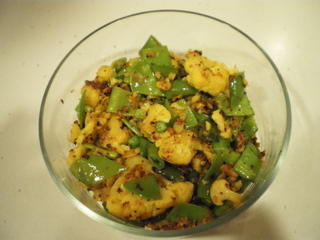 For those of you who cut recipes from the newspaper and actually cook them, here’s a winner from Wednesday’s NY Times that I made to use the plethora of peas bursting from the garden. I used a small Thai chili and three kinds of peas (snap, snow, and English) as that’s what I had, but otherwise followed the recipe almost exactly. Couldn’t resist adding a squeeze of lemon at the end. It was cut and on the counter…
For those of you who cut recipes from the newspaper and actually cook them, here’s a winner from Wednesday’s NY Times that I made to use the plethora of peas bursting from the garden. I used a small Thai chili and three kinds of peas (snap, snow, and English) as that’s what I had, but otherwise followed the recipe almost exactly. Couldn’t resist adding a squeeze of lemon at the end. It was cut and on the counter…
And for those within shopping distance of Berkeley Bowl, you can get fresh turmeric, black mustard seeds, and even Kaffir lime leaves there.
Opinionated cooks
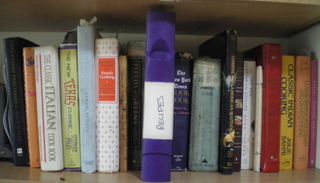 Some of the most charmingly biased writing can be found in the prose of great cooks. Here is Marcella Hazan’s aria on vegetables:
Some of the most charmingly biased writing can be found in the prose of great cooks. Here is Marcella Hazan’s aria on vegetables:
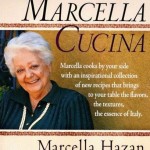 “Perhaps one day the vitality of these still-flourishing markets will be replaced by the pallor of deep-freeze counters, those cemeteries of food, where produce is sealed up in waxed boxes marked, like some tombstones, with photographs of the departed. But I hope it never happens. I would sooner be deprived of all the marvels of Michelangelo.
“Perhaps one day the vitality of these still-flourishing markets will be replaced by the pallor of deep-freeze counters, those cemeteries of food, where produce is sealed up in waxed boxes marked, like some tombstones, with photographs of the departed. But I hope it never happens. I would sooner be deprived of all the marvels of Michelangelo.
“The quality of Italy’s produce is matchless. Only that of France comes close…Do not waste your efforts on second-rate materials. Buy carefully, avoiding any vegetable that is wilted, badly bruised, ill assorted, tired-looking, soggy, flabby, or overgrown. Shopping for good fresh vegetables in this country may be frustrating at times, bit that does not mean we must deliver ourselves up in thralldom to the frozen-food shelves.”
Or the final paragraph of her page-long disquisition (worth reading!) on Parmesan cheese: “The recipes in this book call for freshly grated Parmesan cheese. Do not under any circumstances use ready-grated cheese sold in jars. Even if this commercially grated cheese were of good quality, which it is not, it would have lost all its flavor long before getting to the market. It is of no interest whatever to Italian cooking.”
 Here’s Julia Child on wine: “Food, like the people who eat it, can be stimulated by wine or spirits. And, as with people, it can also be spoiled…If you have not a good wine to use, it is far better to omit it, for a poor one can spoil a simple dish and utterly debase a noble one.”
Here’s Julia Child on wine: “Food, like the people who eat it, can be stimulated by wine or spirits. And, as with people, it can also be spoiled…If you have not a good wine to use, it is far better to omit it, for a poor one can spoil a simple dish and utterly debase a noble one.”
 And here’s Elizabeth David on the same subject: “Nobody has ever been able to find out why the English regard a glass of wine added to a soup or stew as a reckless foreign extravagance and at the same time spend pounds on bottled sauces, gravy powders, soup cubes, ketchups and artificial flavorings. (She adds a long footnote on the poisonous nature of these flavorings, which employ putrid cheese, gas tar and nitric acid.) If every kitchen contained a bottle each of red wine, white wine and inexpensive port for cooking, hundreds of store cupboards could be swept clean for ever of the cluttering debris of commercial sauce bottles and all synthetic aids to flavoring…Sherry is a good addition, but should be used in cooking with the utmost discretion; it is useless to think that the addition of a large glass of poor sherry to the contents of a tin of soup is going to disguise it.”
And here’s Elizabeth David on the same subject: “Nobody has ever been able to find out why the English regard a glass of wine added to a soup or stew as a reckless foreign extravagance and at the same time spend pounds on bottled sauces, gravy powders, soup cubes, ketchups and artificial flavorings. (She adds a long footnote on the poisonous nature of these flavorings, which employ putrid cheese, gas tar and nitric acid.) If every kitchen contained a bottle each of red wine, white wine and inexpensive port for cooking, hundreds of store cupboards could be swept clean for ever of the cluttering debris of commercial sauce bottles and all synthetic aids to flavoring…Sherry is a good addition, but should be used in cooking with the utmost discretion; it is useless to think that the addition of a large glass of poor sherry to the contents of a tin of soup is going to disguise it.”
And I love David’s short paragraph at the end of her “Batterie de Cuisine” section, after she has spent five or six pages detailing essential kitchen tools: “Some sensible person once remarked that you spend the whole of your life either in your bed or your shoes. Having done the best you can by shoes and bed, devote all the time and resources at your disposal to the building up of a fine kitchen. It will be, as it should be, the most comforting and comfortable room in the house.”
If I were ever to teach writing again, I’d include excerpts from these writers along with my favorite essays of George Orwell and Adam Gopnik and some of William Logan’s biting, accurate, and fearless evisceration of contemporary poets (analysis and praise, too, when warranted). The command of grammar (Marcella Hazan, not even a native speaker, makes excellent use of the subjunctive, and Elizabeth David uses the slippery semi-colon perfectly), the passion and the richness of their prose make reading their books not only instructive but pure pleasure for those who love words as much as food.
In case you might want to create the syllabus for such a ravishing course, the selections above are from The Classic Italian Cookbook, Marcella Hazan; Mastering the Art of French Cooking, Volume One, Julia Child, Louisette Bertholle, Simone Beck; and French Country Cooking, Elizabeth David. From Orwell’s essays I’d include “How the Poor Die,” “Some Thoughts on the Common Toad,” “Revenge is Sour,” “Reflections on Ghandi,” and “Such, Such Were the Joys,” in addition the much anthologized (but perhaps slightly too didactic “Politics and the English Language.” Some of these are hard to find, but available in the four volume set of letters and essays, which is worth owning. My favorite Gopnik essays include “Last of the Metrozoids,” “The Rules of the Sport,” “Barney in Paris,” and “Bumping Into Mr. Ravioli.” These are available in Paris to the Moon and Through the Children’s Gate: A Home in New York. You can often find William Logan’s criticism online in “The New Criterion,” as well as his books: Our Savage Art: Poetry and the Civil Tongue and The Undiscovered Country: Poetry in the Age of Tin.
The Amazing Original Homemade Compost Buster
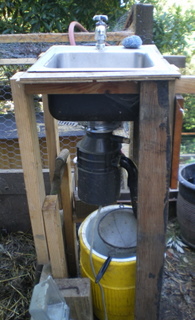 Okay, I have promised MacGyver-type solutions on this site, and here is the first one (if you don’t count the bee egg, which I didn’t invent): the amazing, fabulous, original compost and chicken food grinder, made for a total of under $100 out of a used stainless sink, a used heavy duty garbage disposal, and a new faucet and water line from the hose. You can read this or see it live, captured by my amazing friend and documentarian extraordinaire, Yeh Tung.
Okay, I have promised MacGyver-type solutions on this site, and here is the first one (if you don’t count the bee egg, which I didn’t invent): the amazing, fabulous, original compost and chicken food grinder, made for a total of under $100 out of a used stainless sink, a used heavy duty garbage disposal, and a new faucet and water line from the hose. You can read this or see it live, captured by my amazing friend and documentarian extraordinaire, Yeh Tung.
Compost is pretty simple: kitchen scraps, garden waste, straw or leaves and if you have some animal manure, great! Layer it, water and turn it from time to time, and wait. This is fine if you have unlimited space and time.
The problem is, if you have a small area, there is always too much compost and it takes too long to break down, so there are always more kitchen scraps and garden waste than there is space. Even if you import extra worms, as I did.
Over the years I’ve tried plain, unprotected heaps (attracts rats, raccoons, possums and skunks), drums and plastic compost houses (fill up too fast), and even an expensive machine from Nature Mills that turned kitchen scraps in to a wet smelly mess that was too stinky for inside and attracted flies and bred maggots outside.
My solution is the amazing, easily home built compost buster, made from a garbage disposal. For my prototype, I simply cut a hole in a piece of plywood, set it on a 2×4 stand, screwed the disposal onto it and put a bucket underneath. I used an extension cord and plugged the disposal in to turn it on. I put a strainer on top of the bucket, and used a hose to provide water.
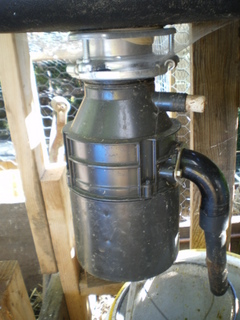 Once I proved to myself that the concept worked (despite all advice to the contrary!), I added a length of old bicycle tire inner tube to the exit of the disposal, and put a cork in the intake valve. I added a sink, a faucet, and a big used Igloo container with a hose bib in place of the drink-dispensing valve.
Once I proved to myself that the concept worked (despite all advice to the contrary!), I added a length of old bicycle tire inner tube to the exit of the disposal, and put a cork in the intake valve. I added a sink, a faucet, and a big used Igloo container with a hose bib in place of the drink-dispensing valve.
The raw material goes into the sink, gets ground up in the disposal and drains into the strainer. The water goes into the cooler. I added a switch to turn the disposal on and off.
 If it’s stuff the chickens will eat, I give the mash to them. This eliminates the litter of rinds and cobbs they usually leave. I make a mash of kitchen scraps. I also let them eat corn cobs and rinds down to the nubs and then take the rinds and cobs out to mash up for the compost along with garden waste, citrus, and onions, where the worms make it into compost practically overnight. The nutrient-rich water goes onto the vegetable garden.
If it’s stuff the chickens will eat, I give the mash to them. This eliminates the litter of rinds and cobbs they usually leave. I make a mash of kitchen scraps. I also let them eat corn cobs and rinds down to the nubs and then take the rinds and cobs out to mash up for the compost along with garden waste, citrus, and onions, where the worms make it into compost practically overnight. The nutrient-rich water goes onto the vegetable garden.
Effective, efficient, and as noted, has a certain (at least to me) poetic elegance of design.
Solstice at Chapel of the Chimes
 Every year on the afternoon and evening of the solstice, the Garden of Memory, at Chapel of the Chimes in Oakland, Julia Morgan’s amazing, labyrinthine columbarium, hosts a concert of eclectic music: didgeridoos, electronic music, strange machines that emit sound, improvisational choirs, instruments made of glass, metal, fiber, discarded dolls and toy trucks… If you can imagine it, it’s there. The place itself is many levels with little courtyards and niches, each one with a different performer, and some grand performance spaces. Steve Kent, pictured above, is one of my favorites. He has a radio show, Music of the World, on KPFA Thursdays at 11 am. Also Orchestra Nostalgico. They seem to play on the deck each year, which is a nice spot to hang out.
Every year on the afternoon and evening of the solstice, the Garden of Memory, at Chapel of the Chimes in Oakland, Julia Morgan’s amazing, labyrinthine columbarium, hosts a concert of eclectic music: didgeridoos, electronic music, strange machines that emit sound, improvisational choirs, instruments made of glass, metal, fiber, discarded dolls and toy trucks… If you can imagine it, it’s there. The place itself is many levels with little courtyards and niches, each one with a different performer, and some grand performance spaces. Steve Kent, pictured above, is one of my favorites. He has a radio show, Music of the World, on KPFA Thursdays at 11 am. Also Orchestra Nostalgico. They seem to play on the deck each year, which is a nice spot to hang out.
At sundown, if you remember to bring a bells (or a bell or a gong or even a set of keys) you can ring then along with hundreds of others. There is something inexplicably powerful about doing this. Probably it calls up ancestral rituals and our Jungian unconscious reverberates. In any case, I’ve gone for the last three years, and can’t think of a better way to celebrate the longest evening of the year.
Breakfast chez moi
This morning: sauteed onions, thai basil, garlic chives, and tarragon with baby kale (all from the garden) topped with softly steamed eggs. I sauteed the onions first in coconut ghee, added the herbs and kale, broke the eggs on top and covered them just till they set. No photo, we ate it all up before I could think of getting out the camera.
The garden takes breakfast to a new level. The ghee is an allegedly health-enhancing alternative to olive oil that I use from time to time. I bought a gallon of it a year ago and have about a pint left. It has a distinctly sweet flavor. Great for roasting vegetables, too.
I was meandering through a hefty volume of Zbigniew Herbert’s prose over breakfast. One of my favorite poets, his prose is savory and acerbic. A short sample I read aloud from “The Poet and the Present”: History does not know a single example of art or an artist anywhere ever exerting a direct influence on the world’s destiny–and from this sad truth follows the conclusion that we should be modest, conscious of our limited role and strength. Yes. More modesty, artists!
Then Larry read the beginning of a book review to me: At some point in the mid-1990’s academic authors in the humanities began to use the verb “complicate” when they didn’t have anything useful to say. They were always talking about how some new consideration or alleged insight “complicates” our understanding of this or that. “Such a view of early Victorian culture,” they’d say, “complicates our understanding of Tennyson’s metrical romances.” Well all right, one thought, but could we get to the part where you uncomplicate it? But they never did.
The review contained that wonderful line of Mary McCarthy’s about Lillian Helman’s memoir, Pentimento: Every word she writes is a lie, including ‘and’ and ‘the.’ Great line, though I remember enjoying the book thoroughly.
 Then I practiced piano for a bit while Larry went on reading the paper. Me to Larry: “Practicing piano yields such direct results. Practicing poetry not so much.”
Then I practiced piano for a bit while Larry went on reading the paper. Me to Larry: “Practicing piano yields such direct results. Practicing poetry not so much.”
Larry: “That’s because with poetry you’re always starting over.”
Too true.
Youth is cruel
Snail, snail glister me forward
Does this line from Roethke’s “Lost Son” make you want to spend some time with his work? Here’s your chance. As a teenager I was thoroughly seduced by Theodore Roethke’s work, and still love it. As Galway Kinnell put it: “I suppose what I like most in Roethke is particularly that interest he had in real things including slimy things that everybody thought were too base a subject for poetry. There aren’t any angels in Roethke’s poems, but there are slugs and worms, and I like that about him.”
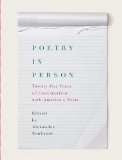 I came back to Roethke to this morning, remembering my great love of Roethke’s work by way of reading Poetry in Person, a series of interviews from a class run by Pearl London at the New School in New York, starting in 1970 and running for almost 25 years. The roster of interviewees is stellar, and the class became famous. Im jealous that I don’t have a similar resource in my life. There’s a short introduction to this book on youtube and a longer video of the celebration of its publication with anecdotes and readings by Maxine Kumin (someone else who writes about real things!), Paul Muldoon, Robert Pinsky, Ed Hirsch and others.
I came back to Roethke to this morning, remembering my great love of Roethke’s work by way of reading Poetry in Person, a series of interviews from a class run by Pearl London at the New School in New York, starting in 1970 and running for almost 25 years. The roster of interviewees is stellar, and the class became famous. Im jealous that I don’t have a similar resource in my life. There’s a short introduction to this book on youtube and a longer video of the celebration of its publication with anecdotes and readings by Maxine Kumin (someone else who writes about real things!), Paul Muldoon, Robert Pinsky, Ed Hirsch and others.
Roethke was not among those interviewed for the class, but the snippet from the Kinnell interview led me to take down my Collected Poems of Theodore Roethke and read through the opening sequence of Lost Son and Other Poems. Roethke deserves a better edition than this badly printed book! There is a Selected Poems, which despite the hideous portrait on the front seems like a book worth owning. Here are three poems by Roethke, and an elegy for Roethke by John Berryman. Roethke’s father owned a nursery and greenhouse, hence all the gardening images.
Orchids
They lean over the path,
Adder-mouthed,
Swaying close to the face,
Coming out, soft and deceptive,
Limp and damp, delicate as a young
bird’s tongue;
Their fluttery fledgling lips
Move slowly,
Drawing in the warm air.
And at night,
The faint moon falling through whitewashed
glass,
The heat going down
So their musky smell comes even stronger,
Drifting down from their mossy cradles:
So many devouring infants!
Soft luminescent fingers,
Lips neither dead nor alive,
Loose ghostly mouths
Breathing.
Wish for a Young Wife
My lizard, my lively writher,
May your limbs never wither
May the eyes in your face
Survive the green ice
Of envy’s green gaze;
May you live out your life
Without hate, without grief,
And your hair ever blaze
In the sun, in the sun,
When I am undone,
When I am no one.
Big Wind
Where were the greenhouses going,
Lunging into the lashing
Wind driving water
So far down the river
All the faucets stopped?—
So we drained the manure-machine
For the steam plant,
Pumping the stale mixture
Into the rusty boilers,
Watching the pressure gauge
Waver over to red,
As the seams hissed
And the live steam
Drove to the far
End of the rose-house,
Where the worst wind was,
Creaking the cypress window-frames,
Cracking so much thin glass
We stayed all night,
Stuffing the holes with burlap;
But she rode it out,
That old rose-house,
She hove into the teeth of it,
The core and pith of that ugly storm,
Ploughing with her stiff prow,
Bucking into the wind-waves
That broke over the whole of her,
Flailing her sides with spray,
Flinging long strings of wet across the roof-top,
Finally veering, wearing themselves out, merely
Whistling thinly under the wind-vents;
She sailed until the calm morning,
Carrying her full cargo of roses.
A Strut for Roethke
Westward, hit a low note, for a roarer lost
across the Sound but north from Bremerton,
hit a way down note.
And never cadenza again of flowers, or cost.
Him who could really do that cleared his throat
& staggered on.
The bluebells, pool-shallows, saluted his over-needs,
while the clouds growled heh-heh, & snapped, & crashed.
No stunt he’ll ever unflinch once more will fail
(O lucky fellow, eh Bones?)—drifted off upstairs,
downstairs, somewheres.
No more daily, trying to hit the head on the nail:
thirstless: without a think in his head:
back from wherever, with it said.
Hit a high long note for a lover found
needing a lower into friendlier ground
to bug among worms no more
around um jungles where ah blurt ‘What for?’
Weeds, too, he favored as most men don’t favor men.
The Garden Master’s gone.
John Berryman
“The Waking” (a villanelle), “My Pappa’s Waltz,” “In a Dark Time,” are some of Roethke’s most famous poems, easy to find online. You can hear Roethke read “Big Wind” if you like. Stanley Kunitz wrote a wonderful tribute to Roethke that gives a sense of the man and his work.
How the garden grows
This is the labyrinth this morning. I can see the plants grow from one day to the next. I’ve let the salad mix and some herbs go to seed in the labyrinth, hoping I’ll see new seedlings soon.
Herbs include all the common culinary herbs, plus borage, hyssop, lemon verbena, summer and winter savory, lemon balm, Thai basil, fennel, rue, feverfew, along with five or six kinds of lettuce, three kinds of chives, and dozens of flowers.
The rest of the front is all flowers.
Along with the stone work, there is drip irrigation, so no watering issues (for once in my life) other than figuring out how often and how long I want the water to drip.
The back, aside from a plethora of poppies, is all vegetables, chickens, and bees.
Here is the famed red mulch, chicken coop in the background.
The baby cucumbers, artichokes, tomatillos, corn, and beans:
and four of the seven pullets, happily eating scraps.
When Larry discovered me baking egg shells this morning before adding them to the compost, he said:
“This is a farm my Okie relatives wouldn’t recognize.”
Indeed! I hope this is not like someone’s dull slide show of their vacation–but I couldn’t resist.

